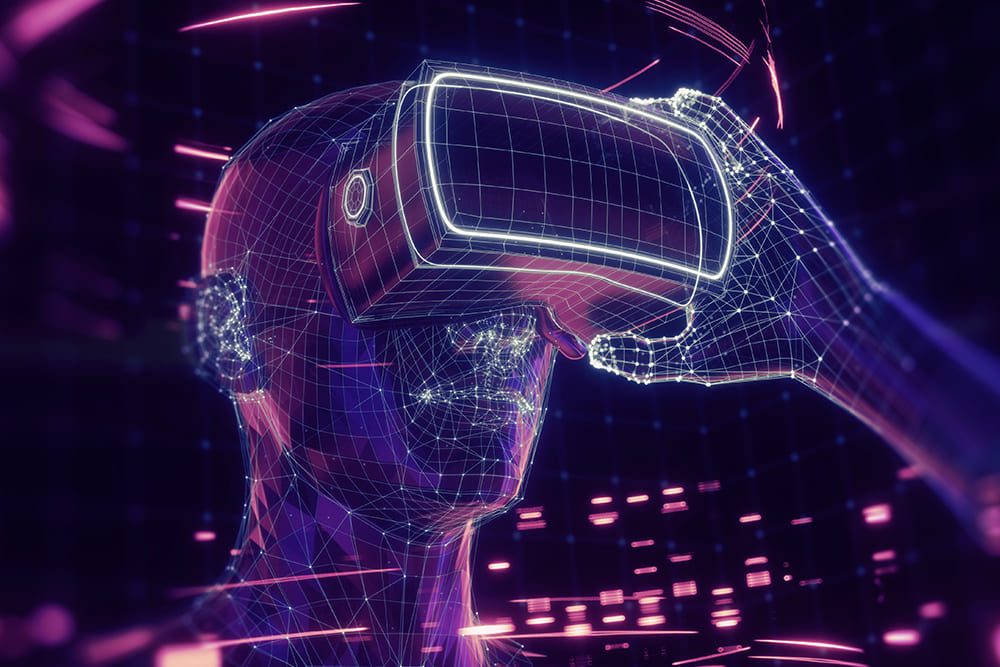The Enterprise Metaverse: What It Means for Businesses
22 October 2021
Is the metaverse the future of digital businesses? Many experts say yes.
The definition of a metaverse is “a persistent, shared, 3D virtual space linked into a perceived virtual universe.”
Sound futuristic? The metaverse may not be as far off as you think.

Mark Zuckerburg has hinted publicly that he wants to create the metaverse. In a perceived step in that direction, Facebook has launched Horizon, their social reality networking app in which avatars can work and play together in a simple virtual environment. Microsoft CEO Satya Nadella has also said he wants his company to build an "enterprise metaverse."
Businesses that want to stay competitive should make plans for how they are going to engage with customers, find new advertising opportunities, and bring in sponsorships in the metaverse.
Cathy Hackl wrote in Forbes recently:
“Just like many in the early 2000s thought they would never need a social media presence (many leaving it in the hands of their summer interns to manage and set up the corporate social media accounts), brands in the 2020s will need to start setting up metaverse teams that will help them enter the era of Web 3.0.”
So what are some ways the metaverse is impacting enterprise businesses (or could impact businesses in the future)? Let’s look at some examples.
Metaverse Opportunities for Enterprise Businesses
Sponsorship of events and concerts: Fortnite recently hosted a huge performance by rap artist Travis Scott. Massive Attack headlined a music festival hosted by Minecraft. As more events and concerts are hosted in the metaverse, companies will have a plethora of opportunities for potentially profitable sponsorships.
Digital-only products: There are huge opportunities to develop products in the digital world. Pretty much anything people have in the real world might be something they want to buy for the metaverse, from cool clothes and outfits to homes, cars, and other things we can't even imagine right now.
Remote work: Work will also increasingly move into the metaverse, from co-working spaces to meetings, to simulations and training. Facebook Horizon’s Workrooms is attempting to take on Zoom and give workers new ways to collaborate online in virtual reality spaces.
Games: Games have long since been the backbone of plans for the metaverse. Check out some of the best VR games on the market right now to look for inspiration for your company.
Process manufacturing: Anheuser-Busch InBev, the world's largest brewer, is using metaverse applications to dramatically improve its operations. They used Azure Digital Twins to create a complete digital model of their breweries and supply chain that syncs up in real-time with the physical environment. The model enables brewmasters to adjust the brewing process and conduct quality control. Click here to see a useful video that illustrates how the digital twin process works.
What’s Next for the Metaverse
Vlad Panchenko, Founder and CEO of DMarket, a marketplace, and technology for building virtual worlds, says the metaverse will grow to include multiple cross-chain possibilities as the virtual economy grows in importance.
"Many brands intuitively or on purpose are moving towards the metaverse which is creating a global economy on track to exceed the current one, many times over," Panchenko says. "There will be no other option but to join it. Otherwise, you will not survive as a company."
As spaces come together into a metaverse environment, it creates enormous opportunities for businesses to not only create awe-inspiring experiences for their customers but also improve their business process, so they maintain a competitive edge.
For more on the metaverse, check out other articles on the topic or my book ‘Extended Reality in Practice.'
Related Articles
L’Oréal’s AI Weapon Could Kill Traditional Beauty Industry Forever
By now, “smart” versions exist of just about every home appliance, gadget and gizmos we can think of. However, manufacturers continue[...]
Beyond The Hype: What Apple’s AI Warning Means For Business Leaders
By now, “smart” versions exist of just about every home appliance, gadget and gizmos we can think of. However, manufacturers continue[...]
Will Quantum Computing Kill Bitcoin?
By now, “smart” versions exist of just about every home appliance, gadget and gizmos we can think of. However, manufacturers continue[...]
11 Most Reliable AI Content Detectors: Your Guide To Spotting Synthetic Media
Since the launch of ChatGPT just two years ago, the volume of synthetic – or fake – content online has increased exponentially.[...]
The AI-Powered Citizen Revolution: How Every Employee Is Becoming A Technology Creator
Something remarkable is happening in organizations around the world.[...]
6 Mistakes IT Teams Are Guaranteed To Make In 2025
The next wave of artificial intelligence isn't just knocking at enterprise doors - it's exposing fundamental flaws in how organizations approach technology transformation.[...]
Sign up to Stay in Touch!
Bernard Marr is a world-renowned futurist, influencer and thought leader in the fields of business and technology, with a passion for using technology for the good of humanity.
He is a best-selling author of over 20 books, writes a regular column for Forbes and advises and coaches many of the world’s best-known organisations.
He has a combined following of 4 million people across his social media channels and newsletters and was ranked by LinkedIn as one of the top 5 business influencers in the world.
Bernard’s latest book is ‘Generative AI in Practice’.










Social Media